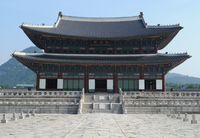
Back Han's fire kommanderier Danish فرمانداریهای ۴ گانه Persian Quatre commanderies French Négy kormányzóság Hungarian Empat Komando Han ID Quattro comanderie di Han Italian 漢四郡 Japanese 한사군 Korean Empat Komanderi Han Malay Han’s fire kommanderier NB

| History of Korea |
|---|
 |
| Timeline |
|
|
The Four Commanderies of Han (Chinese: 漢四郡; pinyin: Hàn-sìjùn; Korean: 한사군; Hanja: 漢四郡; RR: Han-sagun) were Chinese commanderies located in the north of the Korean Peninsula and part of the Liaodong Peninsula from around the end of the second century BC through the early 4th AD, for the longest lasting.[1][2] The commanderies were set up to control the populace in the former Gojoseon area as far south as the Han River, with a core area at Lelang near present-day Pyongyang[3] by Emperor Wu of the Han dynasty in early 2nd century BC after his conquest of Wiman Joseon. As such, these commanderies are seen as Chinese colonies by some scholars. Though disputed by North Korean scholars, Western sources generally describe the Lelang Commandery as existing within the Korean peninsula, and extend the rule of the four commanderies as far south as the Han River.[3][4] However, South Korean scholars assumed its administrative areas to Pyongan and Hwanghae provinces.[5]
Three of the commanderies fell or retreated westward within a few decades, but the Lelang commandery remained as a center of cultural and economic exchange with successive Chinese dynasties for four centuries. At its administrative center in Lelang, the Chinese built what was in essence a Chinese city where the governor, officials, and merchants, and Chinese colonists lived. Their administration had considerable impact on the life of the native population and ultimately the very fabric of Gojoseon society became eroded.[6] Later, Goguryeo, founded in 37 BCE, began conquering the commanderies and eventually absorbed them into its own territory by the early 4th century AD.[7]
- ^ Dane Alston. "Contested domains: The Poetic Dialogue between a Ming Emperor and a Chosŏn Envoy". Retrieved 2 April 2012.
- ^ Lim Jie-Hyun. "The Antagonistic Complicity of Nationalisms". Retrieved 2 April 2012.
- ^ a b "Early Korea". Archived from the original on 25 June 2015. Retrieved 15 June 2015.
- ^ Carter J. Eckert, el., "Korea, Old and New: History", 1990, pp. 13
- ^ Yi Pyong-do, 《The studies of the Korean history》 Part 2, Researches of problems of the Han commanderies, PYbook, 1976, 148 p
- ^ Eckert, Carter J.; el. (1990). Korea, Old and New: A History. Korea Institute, Harvard University. p. 14. ISBN 978-0962771309.
- ^ 'Ki-Baik Lee', "A New History of Korea", 1984 Harvard University Press, page 24'
© MMXXIII Rich X Search. We shall prevail. All rights reserved. Rich X Search